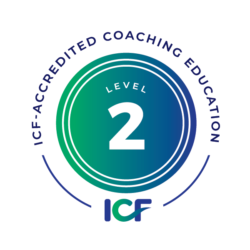Develop your coaching skills and confidence, and learn all you need to know about evidence-based coaching.
DURATION: 150 hours
LOCATION: Online
COURSE FEE: €6,900 (or its equivalent in GBP and USD)
WHO IT IS FOR: new and experienced coaches who want an all-inclusive coach training
AIMING AT: ICF ACC and PCC credentials via the Level 2 path
You will experience a blend of theory and practice that will enable you to grow your coaching competencies and your confidence in a safe and supportive learning environment. By the end of the programme you will have a comprehensive knowledge of coaching skills, coaching ethics, coaching psychology, and how to apply those in your sessions.
The diploma has been approved by the International Coaching Federation and granted the Level 2 programme accreditation. It will enable you to apply for the ICF ACC and PCC credentials through the Level 2 path.

After developing a solid coaching practice in module 1, you will dive into advanced coaching psychology theories in module 2. The curriculum includes the most important approaches of psychology and how they apply to coaching. You will gain a strong theoretical knowledge and also master how to use it with your coaching clients.

Create your own Diploma bundle by choosing the dates of the Level 1 and the Level 2 courses that work best for you.
Cohorts are limited to 8 people. Enrolment closes once the class is full.



The Professional Coaching Skills Certification and the Advanced Diploma in Coaching are the two ICF-accredited programmes we deliver.
The certification is a 75-hour coach training which gives participants the keys to build a strong foundation of coaching. Participants practice coaching skills they learn in the classroom setting, as well as theories and models that can help them understand their clients better. No previous coaching experience is necessary to join the certification. It allows people to apply to the ICF ACC accreditation via the Level 1 path.
The diploma is our 150-hour programme. In addition to building a strong coaching framework, it also includes coaching psychology theories and advanced techniques like CBT, humanistic coaching, and somatic coaching. It enables participants to coach at a more advanced level. The diploma allows coaches to apply to the ICF ACC and PCC accreditations via the Level 2 path.
It depends on what you are hoping to achieve.
If you want to learn coaching skills and apply for your ICF ACC credential, you may register for the certification. You will still be able to complete the advanced coach training at a later stage.
If you already know you want to commit to becoming a coach and apply for your ICF PCC credential one day, we recommend you enrol for the Diploma directly and complete both modules. Instead of paying two courses at the full price, you will save €1,000 on the advanced course.
Both modules of the diploma are delivered in English.
The Advanced Diploma in Coaching is for anyone who wants to develop a solid foundation in coaching with an extensive knowledge in psychological theories and models.
You do not need to have previously coached in order to join the programme.
The Advanced Diploma in Coaching comprises two modules:
Both modules are 75-hour programmes and include live classes, videos and reflections, self-study, and group and individual mentor coaching.
It depends on when you register for module 2. If you want to complete both modules one after the other, it can take 6 to 8 months to complete the diploma (depending on the training dates and your commitment to complete the asynchronous part of the training).
You can read more about our approach here.
Because our approach is centered on the whole person, rather than the problem clients come to coaching for, graduates of the diploma can specialise in many different areas of coaching: life, career, leadership & executive, relationships, confidence, success, well-being, business, etc.
If you are sponsored by your employer or wish to pay with an invoice/by bank transfer, please contact us by email to request a quote that you will be able to submit to your company. If you prefer to pay yourself, we will send you the invoice by email.
Please note that bank transfer is only possible when paying the full amount in one instance. If you wish to pay in monthly instalments, you will need a debit or credit card. We will send you the invoice on the day of the last payment.



We hope you like the content we will share.
Institute of Coaching Studies needs the contact information you provide to us to contact you by email about our services. You may unsubscribe from these communications at any time. For information, please review our Privacy Policy.